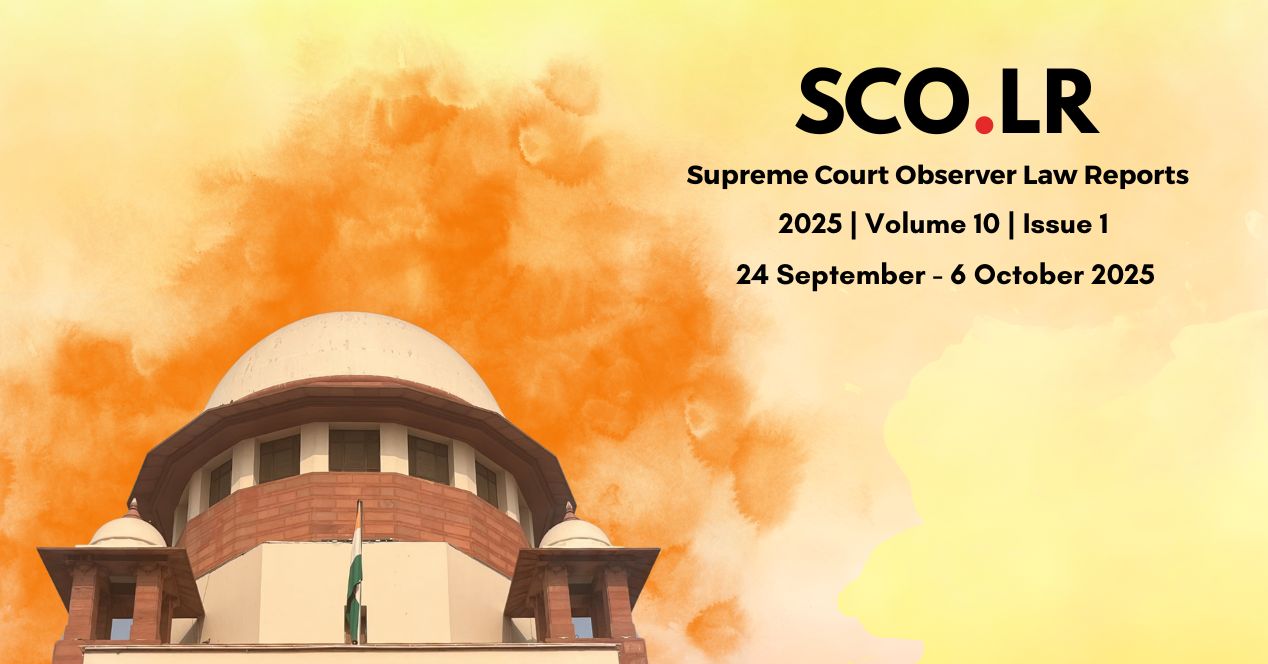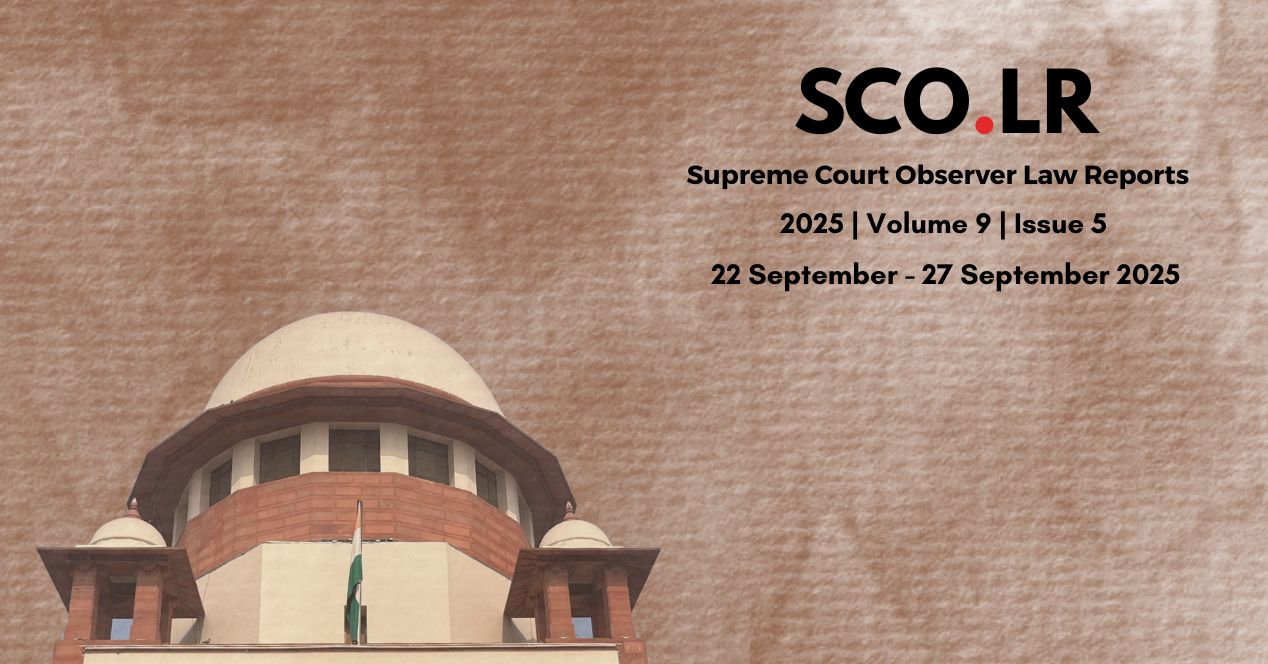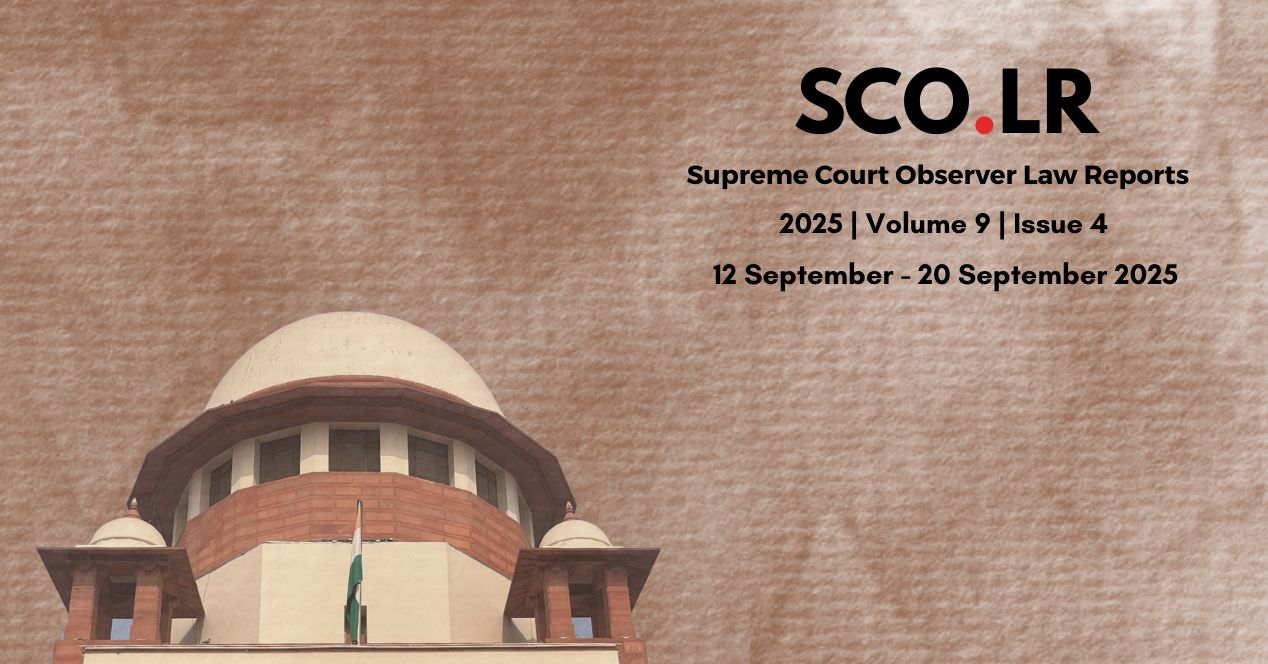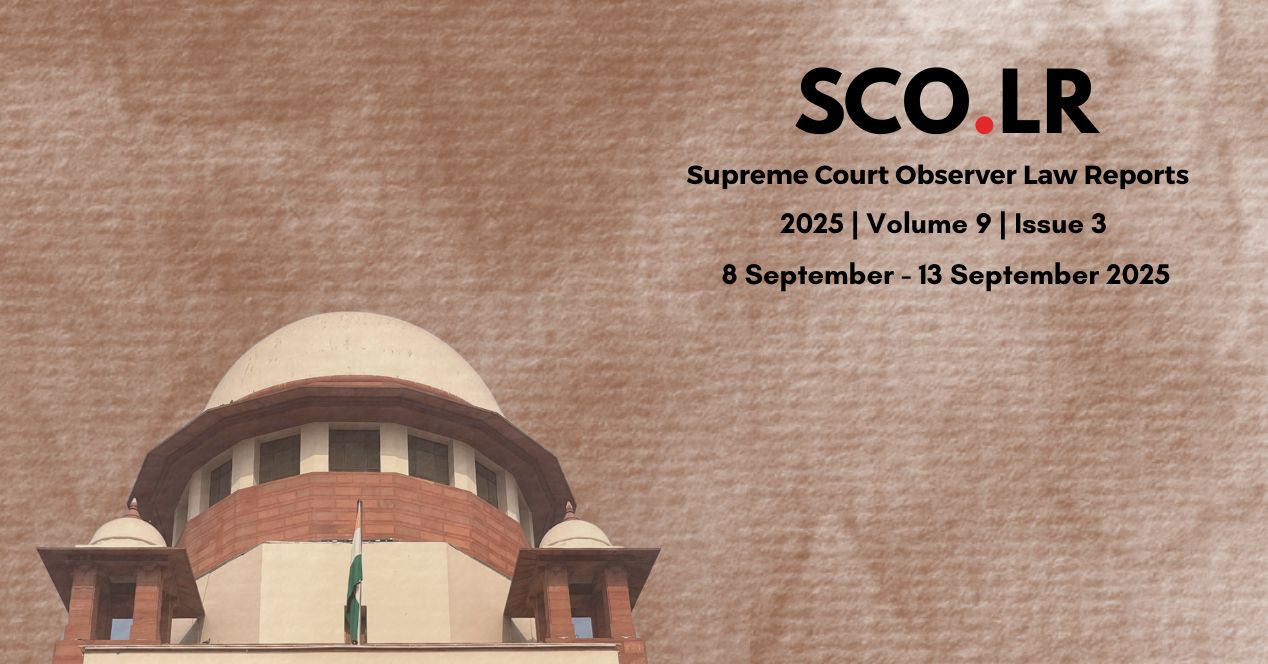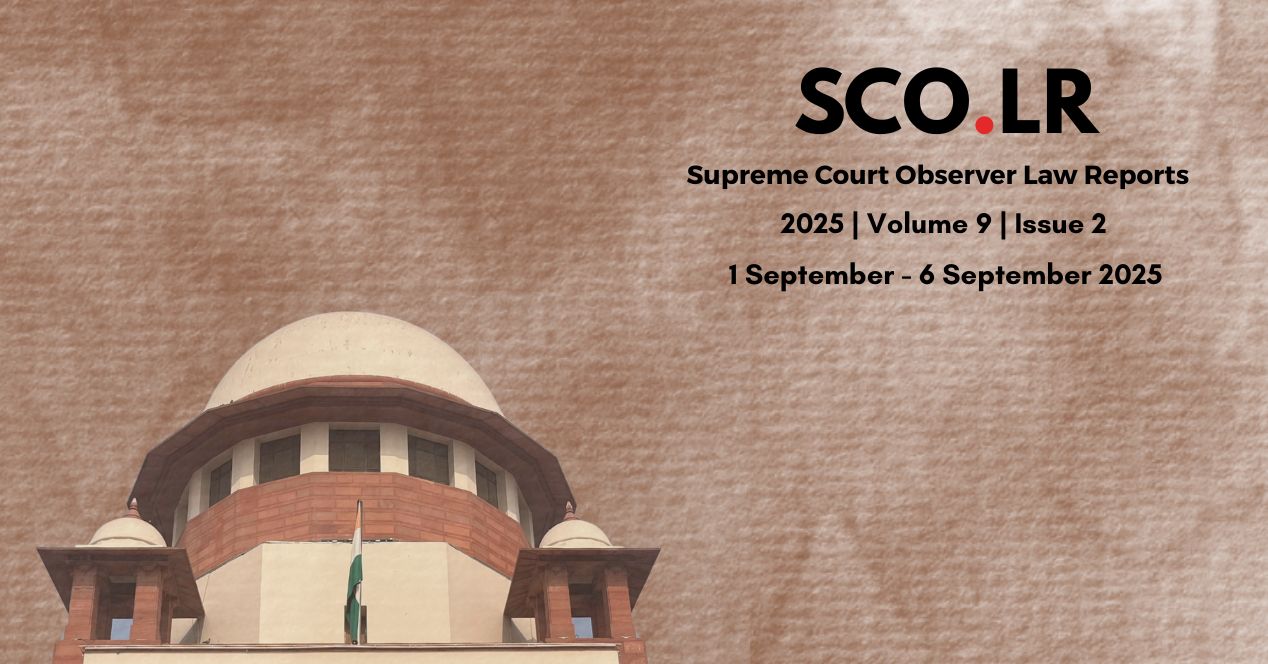Analysis
SCO.LR | 2025 | Volume 10 | Issue 2
In this Issue of SCO.LR, we bring you five important judgements from 6 October to 10 October 2025
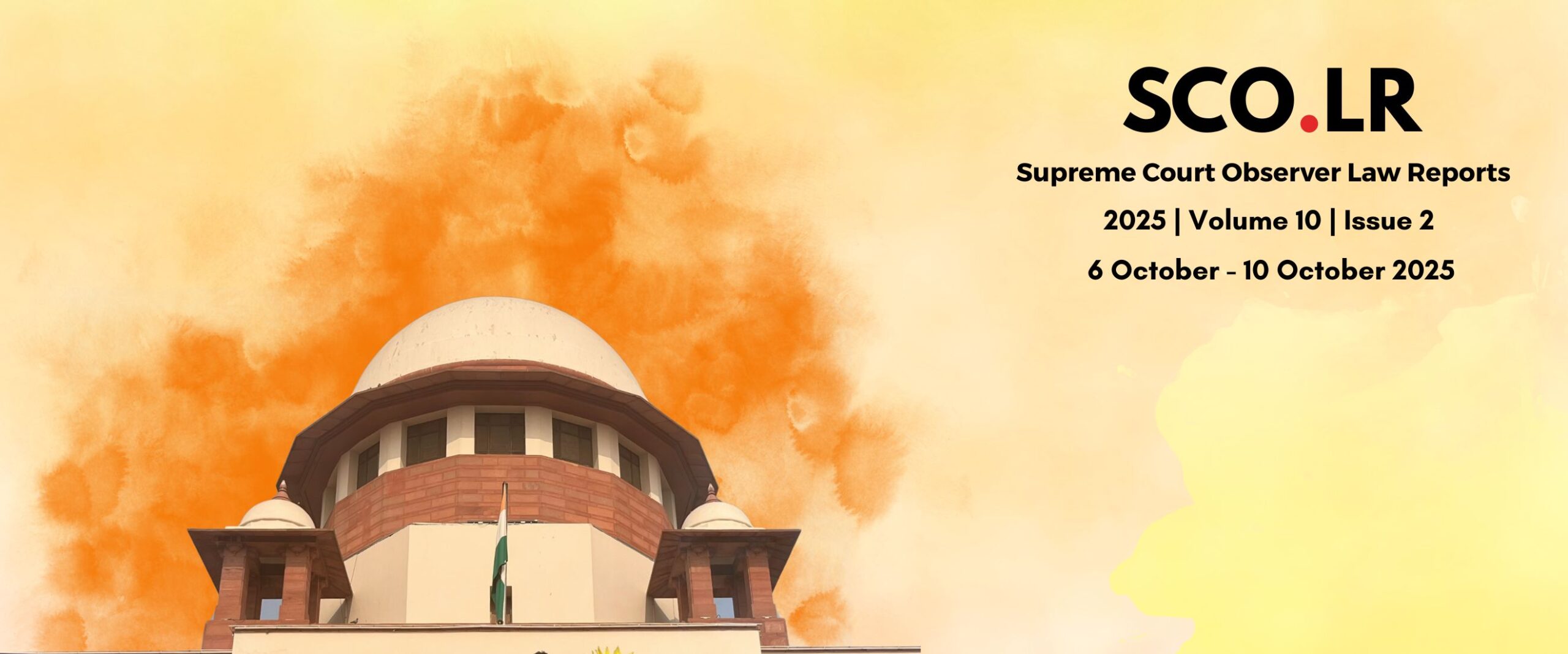
In Volume 10 Issue 2 of Supreme Court Observer Law Reports (SCO.LR), we look at the most important judgements delivered by the top court between 6 October to 10 October 2025.
This week’s judgements deal with :
- Validity of a mandatory experience clauses in public tenders
- The doctrine of public trust in artificial water bodies
- The right to defence under the IPC
- The age-restriction on surrogacy; and
- The liability of a trustee under the Negotiable Instruments Act
Read these judgements in a reader friendly format on our SCO.LR page. Each judgement has been presented visually through our mindmaps. Do check it out!
******
The Supreme Court Observer Law Reports
SCO.LR | Volume 10 | Issue 2
6 October – 10 October 2025
******
Mandatory Experience Clause in Tender Violates Articles 14 and 19(1)(g)
Vinishma Technologies Pvt. Ltd. v State of Chhattisgarh
6 October 2025
Citations: 2025 INSC 1182 | SCO.LR 10(2)[6]
Bench: Justices P.V. Sanjay Kumar and Alok Aradhe
The Supreme Court held that a tender condition which required bidders to have previously supplied goods to state government agencies in Chhattisgarh was arbitrary, discriminatory, and violative of Articles 14 and 19(1)(g).
Vinishma Technologies, a supplier of sports kits to several states, challenged a clause in tender notices issued by the Chhattisgarh Government for the supply of sports kits to government school students. The condition required bidders to have supplied sports goods worth at least six crores to state government agencies of Chhattisgarh in the three preceding financial years. The Chhattisgarh High Court upheld the clause, reasoning that it ensured reliable and timely delivery by suppliers familiar with the State’s geography.
The Supreme Court set aside the High Court’s decision. It held that while the State has discretion to frame tender criteria, such discretion is subject to the constitutional guarantees of equality and freedom of trade. The Court observed that linking eligibility to past supply within Chhattisgarh created an artificial barrier that curtailed competition and excluded qualified bidders, contrary to the doctrine of level playing field.
Key words/phrases: Judicial review of tender conditions—Articles 14 & 19(1)(g)—level playing field—arbitrary and discriminatory restriction—cartelisation—public procurement—fair competition
Read the Judgement here.
Mindmap**********
Application of the Doctrine of Public Trust on Artificial Bodies
Swacch Association, Nagpur v State of Maharashtra
7 October 2025
Citations: 2025 INSC 1199 | 2025 SCO.LR 10(2)[7]
Bench: Chief Justice B.R. Gavai, Justices K.V. Chandran and N.V. Anjaria
The Supreme Court extended the doctrine of public trust, which mandates government protection of natural resources for public use, to include man-made objects that promote the environment.
The Swacch Association filed a Public Interest Litigation (PIL) at the Bombay High Court against constructions developed near Futala Lake, Nagpur. They argued that the lake was a wetland and construction activities in the area violated the restrictions found under Rule 4(2)(vi) of the Wetlands (Conservation & Management) Rules, 2017. The High Court disposed of the PIL holding that Futala Lake did not fall under the definition of a ‘wetland’ under Rule 2(1)(g) of the 2017 Rules, as it was man-made. However, the Court recognised the status of Futala Lake as a wetland as declared by the National Wetland Inventory and Assessment (NWIA). Further, it noted that the Supreme Court had held that wetlands recognised by the NWIA should be protected as per Rule 4 of the 2017 Rules.
The Supreme Court upheld the High Court’s judgement. It reasoned that the doctrine of public trust compels the state to protect the lake and prohibit permanent constructions, even if the Futala Lake is man-made. It observed that much of the construction in and around the Futala lake was not permanent and met the criteria set in Rule 4.
Key words/phrases: Doctrine of Public Trust—Rule 4(2)(vi) of the Wetlands (Conservation & Management) Rules, 2017—protection of wetlands—applicable to artificial water bodies or any object important for ecology and environment protection—High Court judgement upheld
Read the Judgement here.
Mindmap**********
Procedural Failure Cannot Result in Denial of Substantial Right of Defence
M/s. Anvita Auto Tech Works Pvt. Ltd. v M/s. Aroush Motors
8 October 2025
Citations: 2025 INSC 1202 | 2025 SCO.LR 10(2)[8]
Bench: Justices Aravind Kumar and N.V. Anjaria
The Supreme Court held that the failure to file a written statement within the time stipulated under Rule 1(1) of Order VIII Code of Civil Procedure, 1908 (CPC) cannot result in denial of the substantial right of defence through cross-examination.
M/s. Aroush Motors was appointed as a dealer and paid over ₹171,00,000 toward inventory, security, fit-out, etc. When BS-IV vehicles got banned in 2020, the Defendant-M/s. Avnita Auto Tech failed to upgrade stock, stalling business for its dealers. Aroush Motors terminated the dealership in 2020 and sued for damages. The defendant appeared when summons was served in July 2021, but failed to file a written statement within the 120 days mandated for commercial suits. The trial court rejected multiple applications filed by Avnita Auto Tech for extension of time. It excluded the written statement, recorded the examination-in-chief of PW1, and marked the defendant’s cross-examination as Nil. A decree was accordingly passed against the defendant and upheld by the High Court.
The Supreme Court set aside the High Court’s decision. The Bench held that citing procedural lapses for denial of the defendant’s right to cross-examination was “absolutely perverse” and violated the defendant’s right of defence. Further, it noted that a series of Orders passed by the Supreme Court during the COVID-19 (March 2020 and February 2022) excused the application of limitation period. The Court remanded the matter to the trial court.
Key Phrases: Rule 1(1) of Order VIII Code of Civil Procedure, 1908—Commercial Suits—limitation period—delay in filing written statement—denial of damages due to expiration of limitation period—Ranjit Singh v. State of Uttarakhand (2024)—Procedural Flexibility—COVID-19 Limitation Exclusion—right of defence—High Court decision set aside
Read the Judgement here.
Mindmap**********
Age-Restriction on Couples Intending to Parent Through Surrogacy
Smt Vijaya Kumari S v Union of India
9 October 2025
Citations: 2025 INSC 1209 | 2025 SCO.LR 10(2)[9]
Bench: Justices B.V. Nagarathna and K.V. Viswanathan
The Supreme Court held that couples who had commenced the surrogacy process cannot be denied their right to parenthood only because of the age bar under the Surrogacy (Regulation) Act, 2021.
Three couples intending to become parents had commenced the surrogacy process, prior to the commencement of the Surrogacy (Regulation) Act, 2021. They were above the age-limits of 50 for women and 55 for men under Section 4(iii)(c) (I) of the Act. The couples filed a Writ Petition at the Supreme Court, challenging the propriety of the age-restrictions under the Act.
The Supreme Court held that couples intending to have a surrogate child have a constitutional right regulated by statute. The Bench exempted the petitioners from seeking certification on the qualifying age for the purpose of continuing surrogacy procedure, provided they satisfy the other conditions under the Act and the rules.
Key words/phrases: Section 4(iii)(c)(I) of the Surrogacy (Regulation) Act, 2021—date of commencement—upper age limit—50 for female—55 for male—No retrospective application of the Act—if intending couples had begun surrogacy process before commencement of the Act—Right to have child through surrogacy—constitutional right regulated by statute—Other couples similarly placed and aggrieved with age-restriction may approach jurisdictional High Court
Read the Judgement here.
Mindmap**********
Trustee Liable Under NI Act Without Arraigning Trust as an Accused
Sankar Padam Thapa v Vijaykumar Dineshchandra Agarwal
9 October 2025
Citations: 2025 INSC 1210 | SCO.LR 10(2)[10]
Bench: Justices Ahsanuddin Amanullah and P.K. Mishra
The Supreme Court held that a complaint under the Negotiable Instruments Act, 1881 (NI Act) is maintainable against a trustee who signs a cheque on behalf of a trust, even though the trust itself is not made an accused.
A cheque issued by the Chairman and authorised signatory of the Orion Education Trust, which was dishonoured due to insufficient funds. A complaint under Section 138 of the NI Act was filed against the Chairman in his personal capacity as the signatory of the cheque. He contended that Orion, being a juristic entity, was a necessary party and that failure to name it rendered the complaint defective. The Trial Court took cognisance and summoned him. The Meghalaya High Court quashed the complaint and the summoning order, noting that as the drawer of the cheque the trust should be arraigned as an accused. The complainant appealed to the Supreme Court challenging this finding.
The Supreme Court held that a trust is not a legal or juristic person under the Indian Trusts Act, 1882 but an entity vested with the obligations attached to the ownership of property. Consequently, it cannot sue or be sued in its own name and functions only through its trustees. Since the cheque had been signed by the Chairman as an authorised representative, he was personally responsible for the transaction and fell within the ambit of Section 141 of the NI Act. The Court overruled contrary High Court rulings that had equated trusts with companies and restored the criminal proceedings.
Keywords/phrases: Trust—trustee liability—Section 138 and Section 141 of the Negotiable Instruments Act—no requirement to arraign trust—vicarious liability—dishonoured cheque—High Court order set aside—trust not juristic entity—criminal proceedings restored
Read the Judgment here.
Mindmap
